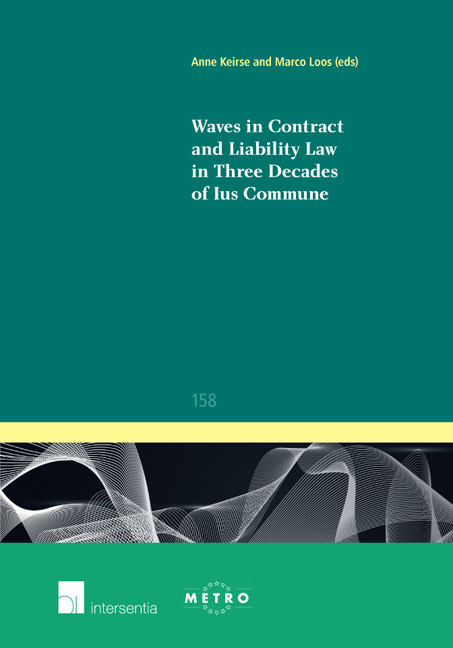Book contents
- Frontmatter
- Contents
- Introduction: The Waves of Contractual and Tortuous Liability
- Concurrence of Claims in Damages and EU Law
- The Procedural Position of a ‘Weaker Party’ in the Regulation Brussels Ibis
- The Principle of Equality as a Catalyst: The Increasing Influence of the Principle of Equality on the Belgian Law of Obligations
- ‘Where the Wild Things Are’ – Reflections on the State and Future of European Collective Redress
- Should Autonomous Agents be Liable for What They Do?
- Private Law Analogies and the Evolution of International State Responsibility for Acts of Non-Governmental Entities Exercising Decentralized/Privatized Governmental Functions
- IUS COMMUNE EUROPAEUM
Should Autonomous Agents be Liable for What They Do?
Published online by Cambridge University Press: 13 October 2018
- Frontmatter
- Contents
- Introduction: The Waves of Contractual and Tortuous Liability
- Concurrence of Claims in Damages and EU Law
- The Procedural Position of a ‘Weaker Party’ in the Regulation Brussels Ibis
- The Principle of Equality as a Catalyst: The Increasing Influence of the Principle of Equality on the Belgian Law of Obligations
- ‘Where the Wild Things Are’ – Reflections on the State and Future of European Collective Redress
- Should Autonomous Agents be Liable for What They Do?
- Private Law Analogies and the Evolution of International State Responsibility for Acts of Non-Governmental Entities Exercising Decentralized/Privatized Governmental Functions
- IUS COMMUNE EUROPAEUM
Summary
Introduction
After decades of developments in information technology and artificial intelligence, ‘autonomous’ systems have come to play important roles in our society. In the Netherlands decisions about study grants are in first instance taken by a computer programme. Computer programmes keep track of the stocks of shops and order new supplies if necessary. These orders are accepted by other computer programmes, which prepare the physical delivery of the ordered goods. Websites offer goods for sale, and sometimes make the price dependent on information they gather about potential customers. These events and acts all take place in a virtual world, but also physical things have become autonomous agents. For quite some time already aircraft autopilots play an important role in air planes. Weapons have been developed that take decisions about life and death without direct human interference, and the development of selfdriving cars has drawn much attention. The ‘internet of things’ is still on the brink of emerging, but it seems a safe prediction, that some of these ‘things’ will turn out to be autonomous systems.
These new developments raise many questions. How will human beings respond to autonomous systems if they have to interact with them? Is it morally right to have machines take actions in matters of life and death? And – from a legal perspective – is it possible and desirable to hold autonomous agents responsible and liable for what they did?
These last questions represent the core of the present article. Before going into more detail on the arguments to come, we must f0069rst mention a preliminary question: does it make sense to write about autonomous agents and their acts if we are not dealing with human beings? Can we say that soft ware applications and automated physical systems really act, or are the real agents always human beings, who may use soft ware and hardware tools to realize their intentions? If the latter is the case, the issues of responsibility and liability do not arise for these other systems. As will turn out later, the answer to the question whether it makes sense to write about autonomous non-human agents is a substantial part of the answer to the question whether it is possible to hold these agents responsible. The answer to this preliminary question can therefore only be given in the context of the main argument of this article.
- Type
- Chapter
- Information
- Publisher: IntersentiaPrint publication year: 2017



